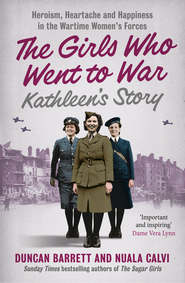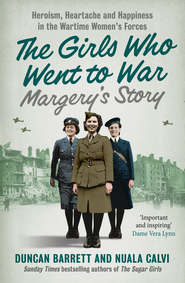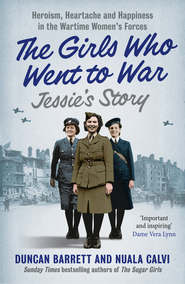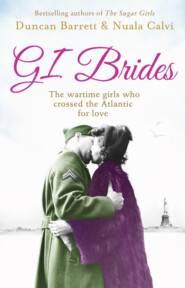По всем вопросам обращайтесь на: info@litportal.ru
(©) 2003-2024.
✖
The Girls Who Went to War: Heroism, heartache and happiness in the wartime women’s forces
Настройки чтения
Размер шрифта
Высота строк
Поля
One day, Margery was sitting in the NAAFI with Oriole after a long and dreary afternoon in the classroom when an Army chap took a seat on the bench opposite them. As he warmed his hands over a steaming mug of coffee, he asked her, ‘Got any ciggie coupons, love?’
Margery looked up, startled. She and her friend didn’t usually attract the attention of the servicemen.
The man was a good ten years older than her, of medium build, with dark hair. There wasn’t much that was remarkable about him, except for a strong Lancashire accent, but he had a friendly face and that was something Margery was sorely missing.
‘I think I might have – hold on a minute,’ she said, rummaging in her pockets until she found her cigarette ration card. Since she didn’t smoke, she was happy to hand it over.
‘Don’t you want anything in return?’ the man asked, surprised.
‘Oh no, it’s all right,’ Margery told him.
‘Aw, go on,’ he pushed her. ‘How about a nice choccy coupon? That’d be a fair swap, wouldn’t it?’
Margery smiled shyly. ‘Yes, please,’ she said, taking the chocolate coupon gratefully.
The man seemed to interpret their little transaction as permission to stop and chat. Before long he had introduced himself as James Preston and was nattering away about the Army catering course he was doing in Penarth. He had an easy, Northern warmth, and Margery suspected that he, too, must be lonely and just keen to find someone to talk to while he was so far away from home.
Usually Margery kept on eye on the clock until 6 p.m. every evening, when she and Oriole were permitted to return home, so it came as a surprise when her friend pointed out that they were in danger of being late for dinner. ‘Better get moving, old thing,’ Oriole told her cheerfully. ‘Mrs Poole’s potato cakes wait for no woman!’
But before Oriole could drag her away from the NAAFI, Margery had agreed to meet James for coffee there the following day – and soon the afternoon chats had turned into a regular arrangement. For the first time since she had arrived in Penarth, Margery had begun to feel less cut adrift. All day long, as she studied the relentless lists of items and their numbers, she looked forward to the time she would be spending in the NAAFI with James.
With the end of Margery’s course looming, the need to study only increased, as she became more and more anxious that she might fail the dreaded test. Night after night, she went over the long list of forms and parts until her eyes were swimming with numbers. But the thought of having to write home and admit to her family that she had fallen at the first hurdle in the WAAF, and imagine them laughing at her ambitions again, was unbearable.
Finally, the dreaded day arrived, and Margery and the 60 other girls who had trained alongside her turned over their exam papers. She summoned all her brain power to the task of recalling as many of the wretched forms and parts as she could, as well as the various processes and procedures she had learned. But by the time she reached the final page of the exam, she had only been able to answer less than half of the questions.
The following day, the girls were ordered to line up in alphabetical order on the seafront. One by one, their surnames were called out, and their results were read off in front of everyone. Margery cringed as a good few of the As, Bs and Cs in the group were told that they had failed to reach even the remarkably low pass mark of 40 per cent. It was an agonising wait until the sergeant finally made it down to the letter P. ‘Pott,’ she barked, ‘40 per cent exactly. Pass.’
Margery blinked her eyes in the early morning sunlight. She couldn’t believe it – somehow, she had succeeded where so many others had failed. Despite her terrible memory and her crippling nerves, she had scraped through.
The poor girls who hadn’t been so lucky soon heard their fates. One of them was furious when she found out she was being sent to train as a cook. ‘I wanted to be in accounts!’ she cried miserably. But it was no use – once the Air Force had made up its mind, the decision was final.
Meanwhile, the girls who had passed the test were marched off for a series of inoculations. Feeling heady after her unexpected victory, and exhausted from the stress of the past few weeks, Margery fainted before she even saw the needle.
The next day, the girls were issued with railway warrants to take them home, so that they could spend a bit of time with their families before they had to report to their new postings. Margery was sorry to say goodbye to James Preston, but he had taken her service number and promised that he would write. The two months she had spent in the WAAF was the longest she had ever been away from home, and she felt desperate to get back to North Wallington again.
After a long train journey, Margery walked up the lane to the old maltster’s house, carrying her grey kitbag over her shoulders. The neighbours came out of their houses to get a look at her in her uniform, and when her parents opened the door she could see a glimmer of pride in their eyes.
Margery felt proud of herself too, she realised with a start. Nobody was laughing at her now.
3
Kathleen (#u62bf13a9-3f5a-5ba5-a9b3-edd9994281c9)
Although thousands of girls up and down the country were joining up for the fight against Germany, not many of them could claim to have actually seen Hitler in person. But Kathleen Skin, a 19-year-old nanny from Cambridgeshire, was something of a rarity. In August 1939, she was staying at a hotel in Cologne when it was visited by some very high-profile guests.
Kathleen was on her way to a church summer camp in Denmark, and was staying in one of the hotel’s cheapest rooms, up by the servants’ quarters in the attic. One evening as she was returning to her room, a housemaid came up to her and whispered, ‘Do you want to see the Führer?’
‘What, here?’ Kathleen replied, astonished.
‘Yes,’ the girl said, excitedly. ‘He comes tonight for dinner. You can look from up here, but do not let anyone see you.’
‘All right,’ Kathleen said, taking up a good viewing position at the top of the stairs. She was eager to catch a glimpse of the man whose name was on the lips of everyone in Europe.
Peering down the stairwell, Kathleen watched as a little man in uniform strode into the hotel, accompanied by a large entourage. A quick glimpse of his famous toothbrush moustache was enough to convince her that it really was Hitler. It was strange to think that such a small, unimpressive-looking person could be holding the whole world to ransom.
After a couple of moments, the official party was whisked into the dining room. Kathleen crept back to her bedroom, pleased that she would be able to go home and tell her family that she’d actually seen the German chancellor.
Since childhood, Kathleen had always been gripped by a lust for travel. She had learned to read at an early age, and had devoured Robinson Crusoe and Swiss Family Robinson, dreaming of one day visiting such exotic lands herself. She loved nothing more than listening to her father tell stories about his adventures in India when he was a young man in the Army, or her mother’s tales of growing up in South Africa, where her Danish grandparents had moved during the gold rush.
Kathleen’s parents had met when William Skin was on his way back to Britain to be demobbed. While he was passing through Cape Town, a naval revolt had broken out, and he and his fellow soldiers had found themselves ordered to disembark and take over, until replacement sailors were sent out by the Navy. While he was there he had joined the local glee club and been enchanted by the red hair and green eyes of the lovely Amelia. He had promised to return and marry her as soon as he left the Army, but their romantic plans were scuppered by the outbreak of the First World War. Mr Skin was one of the first to be sent over to France, where his trench was so badly shelled that the stretcher-bearers left him for dead. It was only when a burial party came around to collect the dead bodies that they realised he was still alive and rushed him to hospital.
In time, Mr Skin had recovered sufficiently to be able to walk again, but the muscles and tendons in one leg were so badly damaged that he was left with a strange lolloping gait. He had lost the sight in one eye and his hearing had been affected too. He was convinced his beloved would no longer want him in his current state, but Amelia insisted he return to Cape Town and marry her, despite her parents’ protestations that she was shackling herself to an invalid.
Mr Skin brought his new wife back with him to England and their family soon began to grow, but with just his pension from the Army to live on, feeding their five children grew increasingly hard. Throughout Kathleen’s childhood, the family moved from village to village around Cambridgeshire, always going where the housing was cheapest. Wherever they went, they were seen as eccentrics. Mrs Skin scandalised the local women by allowing her daughters to wear trousers, while her husband was the only man they knew who was happy to push a pram for his wife.
Kathleen had inherited her mother’s striking red hair and green eyes, as well as her gift for performance. She and her sisters would compose poetry and plays that they put on for the village children, and her older sister Lila kept her friends in the playground enthralled with tales of how she was really a princess, forced to live in poverty until she could one day return to reclaim her palace.
The Skins’ house was always a favourite with the local kids, thanks to the unusual and imaginative games the family played. But one day when the other children had all left, Mr Skin turned to Kathleen and asked, ‘Why don’t you go home as well?’
‘I am home, Dad,’ Kathleen replied, wondering if her father was playing some kind of joke.
‘No, you’re not,’ her father insisted. ‘You’re not one of mine.’
Kathleen did her best to shrug off the strange remark, but it wasn’t long before her father was exhibiting other odd behaviours. Mr Skin had imparted a love of nature to his children, dragging them out of bed in their pyjamas to witness flocks of migrating birds coming over from Africa, or to count falling stars. But now he began talking to the birds as if they could understand him, and disappearing for hours on end, no one knew where. When he was found one day wandering the roads with no idea who he was, the whole family was forced to acknowledge that something was seriously wrong, and Mr Skin allowed himself to be taken to Fulbourn mental hospital.
X-rays eventually revealed that the shell that had almost killed Mr Skin in the war had left bits of shrapnel scattered throughout his brain. The peculiar effects came and went – for months at a time he would be perfectly fine and was able to return home to his family, but then the madness would begin again, and he would have to go back to the asylum.
Kathleen was a bright girl, but her educational prospects had been limited. Her older sisters Maevis and Lila had gone to grammar school, but by the time her turn came around there simply wasn’t the money to send her – even though she had won a part-scholarship from the council. Instead, she attended the local technical school, where even her teachers admitted that her academic abilities were wasted. Kathleen found many of the classes there dull, but she did enjoy the weekly childcare lessons. She loved bathing the tiny babies and learning about their development, so when she left school she decided to become a nanny.
Kathleen had been working for a doctor’s family in West London when the opportunity came up to visit Denmark with the church summer camp. Her employers had willingly given her the time off, and she spent an enjoyable few days swimming in the sea and learning to sail a dinghy.
On her way back through Germany, she stayed with a family in Kiel who her father had befriended after the war, in the belief that if old enemies could bury the hatchet it might help prevent another major conflict. They had three strapping blond blue-eyed boys, the oldest of whom, Konrad, was about her age.
One day, the boys invited Kathleen to come with them on an organised march through the local countryside. ‘It will be great fun,’ Konrad told her enthusiastically. Never one to turn down a chance for adventure, Kathleen agreed, joining the three lads as they set off in matching brown shirts with swastika armbands.
They met up with a group of younger boys and girls who Konrad explained were Deutsches Jungvolk – the junior section of the Hitler Youth. As the march progressed, they were joined by more and more young people, until Kathleen found herself among hundreds of German youngsters all dressed in Nazi uniforms.
The march culminated in a huge rally where everyone performed the Hitler salute together. For a British girl, far from home, it was a strange and unsettling spectacle to witness.
When the boys brought Kathleen back to their house that evening, their father was waiting for her anxiously. ‘You must pack your bags now,’ he told her. ‘It is time for you to leave.’
‘But I’ve still got a few days’ holiday left,’ she protested.
‘No, you must go now,’ the man insisted. ‘You cannot be in Germany.’
He found a friend with a car and took the bewildered girl to the Dutch border, where he gave her instructions to catch a ferry back to England.
Two days later, German forces invaded Poland. Kathleen had scarcely got back to British soil before her country found itself at war with Germany.











